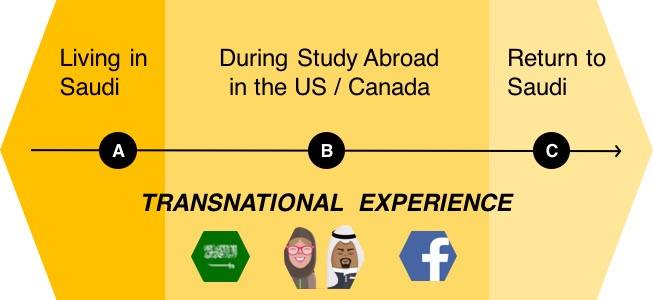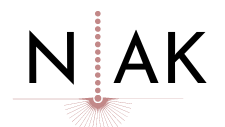Dissertation Project: A Cross-Sectional Study of Transnational Saudi Youth To Explore The Use of Facebook For Enacting Privacy & Manifesting Identity (2014-2017)
I conducted 34 face-to-face in-depth interviews and co-design sessions with transnational Saudi Arabian youth living between the United States and Saudi Arabia–namely, international students–to investigate their use of Facebook. In particular, this study provides unique insights from a user-experiance research on the use of one platform across two radically different contexts–i.e, Saudi Arabia and the United States–and clarifying the implications of emerging technologies used in a transnational social field on human values to better our understanding of cross-cultural global design.
This dissertation contributes are threefold: (1) Enrich the understanding of cross-cultural privacy and identity management with regards to social media in an Arab Context. (2) Offer Culturally-Inclusive Design principles that incorporate previously unexplored characteristics of privacy and identity.(3) Finally, clarify the bidirectional effects of technology use and adoption on cultures and vice versa: social shaping of technology and social impact.
Early versions of this work were presented at the ACM conference on Designing Interactive Systems(DIS) in 2016, the ACM conference on Computer-Human Interaction (CHI) in 2015, the Association of Internet Research (AoIR) conference in 2o14. My dissertation advisor is David Hendry and my committee constitute of Elizabeth Churchill, Katie Davis, and David McDonald.

Cross-Cultural Privacy and Social Media in the Arab Gulf (2015)
During my time as an intern with QCRI , I lead a couple of collaborations to study the meaning of Privacy in the context of the Arab Gulf, and how it is enacted on social media. The research project resulted in two publications, one was presented at the ACM conference on webScience (2016) and the second was presented at the ACM conference DIS (2016.)
Predicting Unspoken Views on Twitter (2015)
My colleagues and I worked with a set of 8.36 million tweets from Twitter collected after the Paris terrorist attacks on November 13, 2015 to study the manifestation of Islamophobia online. specifically, we provide quantitative and qualitative analysis of this set of tweets to analyze the reaction towards Muslims after the attacks. An earlier published version, lead to additional research using the same data to examine the effect of online social network interactions on future attitudes. In specific, we focus on how a person’s online content and network dynamics can be used to predict future attitudes and stances in the aftermath of a major event. The results of this research were presented at ACM conference on webScience (2016) and featured in multiple news outlets.
Social Botnet Use During the Ongoing Syrian Civil War (2013-2015)
My colleagues and I worked on this research project to uncover the new and important phenomenon of Social botnets on social media. In this project we considered one specific social botnet in Twitter to understand how it grows over time, how the content of tweets by the social botnet differ from regular users in the same dataset, and lastly, how the social botnet may have influenced the relevant discussions. Our analysis was based on a qualitative coding for approximately 3000 tweets in Arabic and English from the Syrian social bot that was active for 35 weeks on Twitter before it was shut down. We found that the growth, behavior and content of this particular botnet did not specifically align with common conceptions of botnets. Further we identify interesting aspects of the botnet that distinguish it from regular users, such as the frequency of tweeting and the connectedness of the retweet social network. Finally, we observed two distinct tactics that the SSB used to point attention away from relevant information (about the Syrian civil war) and influence perception: misdirection and smoke screening. The results of this work were presented at the ACM Conference on Computer Supported Cooperative Work (CSCW) in 2015. This project also motivated a larger research project on political bots that I cofounded with my colleagues and was awarded an Early concept Grants for Exploratory Research (EAGER) by the NSF.
IDEO Project: Healthier Food Options for Homeless Adults in the Seattle Area (2014)
This project was part of an online course I registered for on Human-Centered Design for social good with the goal of gaining hands-on experience through a real-life project on the iterative Design Thinking process (i.e., Investigate, Ideate, Prototype, and Evaluate). I took this three-month-course through the IDEO learning portal in fall 2014 with a team I formed of 3 professionals in the Seattle area. Over the course of this project, I participated in the designing and execution of the data collection and analysis phase that centered on promoting the healthiest food options for homeless adults in the Seattle area. One limitation to this study was regarding the limited access we had to the homeless population, due to the lack of an ethical approval at the time. I mitigated for this though gathering as much information from stakeholders who are in direct contact with homeless adults.
As a first step towards understanding this population and their dietary habits, we spent time volunteering at my neighborhood’s food bank, as a form of in-context immersion. We also attended lectures at homeless shelters and interviewed case-managers who provided in depth knowledge on the day-to-day experiences of homeless adults with finding food options in the city. We discovered that one of the main reasons preventing the homeless population from choosing healthy/fresh food items was closely tied with the transient nature of their life, risking the food to perish in their bags. Which as a result, influences their decision and preference to pick canned food items from the food bank. Making a step towards solving this issue, our research resulted in an innovative solution that comprised a low-fidelity prototype of an improved shopping bag that can also be used to transport their other daily items. The bag prototype included a solution to distribute the weight equally and efficiently to make traveling with vegetables and heavy items possible for homeless adults. I communicated the result of this project through a slide deck that explained the process and the suggested solution then shared on the IDEO course website for peer assessment.
Youth, ICTs, and Democracy in Egypt
The TASCHA research group conducted a study to qualitatively understand the role of social media (Twitter and Facebook) during the Egyptian uprising in 2011 that resulted in the resignation of Hosni Mubarak. I developed an API-based application to retrieve the Facebook posts from different public groups that were key in the calling and organizing of the revolution (this tool is public on my website for other researchers.) I also coded and translated the Arabic Facebook posts, then conducted focused analysis to report on the roles of Facebook in the process of the Egyptian revolution. This research was funded by a grant from Microsoft Community Affairs to the Technology & Social Change Group at the University of Washington. (Slides)
Computer Training to Empower Day Laborers in Seattle
My colleagues and I designed and implemented this research to study the use of ICTs among extremely underserved minorities such as impoverished immigrants in the US. We combined structured interviews, focus groups and observations to understand the physical and psychological barriers that prevent Hispanic day laborers in Seattle from making effective use of computers and the Internet.This project resulted in a paper presentation at The Hawaii International Conference on System Sciences (HICSS) and the development of the Fearless Cards: a set of basic, easy-to-use instructions to help extremely under-served populations learn to use computers and overcome their fears and lack of self-confidence.
“What is the healthiest hosting?” University of Washington Medical Center
My Masters capstone project reflects my strong interest in computer security and privacy for mobile and cloud systems. For this project we conducted 6 interviews with organizations and private consultants regarding their experience with cloud computing and how it affected their business.Assisted Campus Health Services in their planned migration of public and occupational health services from in-house servers to a cloud hosted solution. Lastly, built a risk assessment report based on cost-benefit-analysis and stakeholder interviews. The results of this research was presented and published at the Americas Conference On Information Systems (AMCIS 2012).
